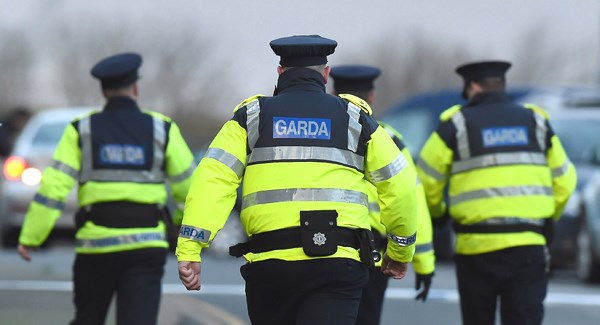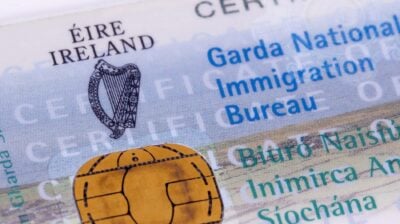Your rights and the Gardaí
Your rights when stopped, when arrested, when searched and when detained.

All people in Ireland have certain rights when it comes to contact with the Gardaí. These rights apply to all people, young or old; however young people and certain other groups may have additional or slightly different rights.
In this article
- Your rights when stopped by the Gardaí
- Your rights when placed under arrest
- Your rights when searched
- Your rights at the Garda station
- Your rights if you are under 18 years of age
- Your rights and disabilities
- Your rights as a foreign national
- Your rights during protests
- Your rights and the Criminal Justice (Public order) act
- Your rights when interviewed by the Gardaí
- Your rights and identification parades
- Your rights and biological samples
- Your rights as a victim of a crime
- Your right to enter into the Juvenile Diversion Programme
Your rights when stopped by the Gardaí
- A member of the Gardaí can ask any member of the public to stop at any time. You may be legally bound to stop if the Garda believes that you have committed an offence/are committing an offence under the Offences Against the State Acts or if the Garda wishes to check the tax and insurance on your car.
- The Offences Against the State Acts are a series of laws passed by the Irish Government to stop terrorism, namely the IRA.
- If the Garda is not wearing their uniform, they must show you identification if you ask them.
- You may need to give your name and address. If you refuse to do so, you could be arrested.
- If the Garda asks you to go to the station with them, you should ask if you are under arrest. If you are under arrest, you must go with them. Fighting it will only add another charge to your case, such as resisting arrest. If you are not under arrest, you do not have to go to the station.
- The Gardaí have the right to take you into custody if they believe that you are suffering with mental ill health and could harm yourself or others as a result.
Your rights when placed under arrest
- In Ireland, a Garda does not need an arrest warrant to arrest you in many circumstances, such as: an offence under the Road Traffic Acts, an offence under the Public Order Act or if you seem to be committing a serious offence.
- The Gardaí can enter your home to arrest you for an offence with a penalty of at least five years in prison.
- In order to be arrested, the Gardaí must have a reasonable suspicion (this is a specific legal term) that you have broken the law. You can’t be arrested just because they believe you could help with another criminal investigation, unless the criminal investigation is to do with an offence under The Offences Against The State Act.
- You have the right to be told very clearly that you are under arrest and the reason for your arrest.
- As mentioned above, it is best not to resist arrest, even if you think you are being wrongfully arrested. Resisting arrest is a crime in itself.
- Gardaí may use reasonable force to arrest you. However, if excessive force or physicality is used, you can take a case to the Garda Ombudsman. You can also sue the arresting Garda/ An Garda Síochána for assault where the force used is excessive.
- You can be arrested a few times if the Gardaí wish to re-question you about a specific offence, if there have been recent developments in the investigation or if they wish to formally charge you.
- If you are charged with a crime, it will be written down on a charge sheet. This sheet details the offences you have been charged with and a Garda will read it out to you.
- You do not always have to be charged to be prosecuted by the Gardaí; you may instead receive a summons to court.
- The length of time you can be held without being arrested depends on the alleged offence you are being questioned about. Click here for further information on detention times.
Your rights when searched
- A Garda may search you if they have a reasonable suspicion that you have committed a crime. In such a case, you can be searched without your consent.
- The Gardaí also have power to search you for illegal drugs under the Misuse of Drugs Acts, and bring you to a Garda Station for the search.
- Before searching you, a Garda must explain to you in plain English why they want to do so.
- A member of the same sex must search you if the search consists of more than a pat down over your clothes. Often, a member of the same sex will perform a pat down though.
- Customs officers have the legal right to search you. Some employers may also have the right to search you if it is written into your contract. However, security personnel never have the right to search you.
- The Gardaí have the right to search your car or any car you are a passenger in if they have a reasonable suspicion that you have committed/are about to commit a certain crime or that you have drugs on you or in the car.
- You can be searched at home, at work, on the street or in a Garda station.
- A Garda generally needs a warrant to enter your home to search, but they can occasionally enter your home if they are chasing you and you have escaped to your house, or if they have come to arrest someone in your home. They can also enter your house if they believe someone is committing a crime in your home.
- A Garda must meet certain conditions when searching your home:
- They must tell you why they are searching.
- They are entitled to take any items that could be used for the case.
- They cannot tell you to remain in a certain room or segment of the house unless you are under arrest.
- The Gardaí are entitled to look at your computer and even take it away if necessary.
- You cannot try to prevent the Gardaí from entering your home; doing so could cause you to be charged with a crime such as obstructing the course of justice.
- It is important to note that security guards do not have any power to search you without your permission, and may only detain you if they believe you have committed an offence and are attempting to avoid arrest by the Gardaí. If a security guard does arrest you, they must transfer you to Gardaí as soon as possible, who may carry out a search if necessary.
Your rights at the Garda station
- Your time in custody will be recorded on what is called a custody record. This details the reason for your arrest and the time at which you arrived, as well as your personal details. It should also include a record of solicitor or doctor visits and of any food you were given.
- Every Garda station has a ’member in charge’. This person is responsible for ensuring that all procedures and laws are followed regarding your care. If there is an issue, you can ask to speak to them.
- You have the right to speak to a solicitor immediately. You also have the right to request medical attention and to get your regular prescriptions.
- A member of your family must be told that you are being kept at the Garda Station. You may also be entitled to one visit from someone, as long as the Gardaí do not think it will interfere with the investigation.
- You have the right to be served at least two light meals and one main meal during any 24-hour period of time.
- You are entitled to sleep for eight hours between midnight and 8 a.m.; however this may not count towards your total detention time and you may be kept longer than if you hadn’t slept.
Your rights if you are under 18 years of age
- You can be charged if you are under 18. However, the Gardaí must follow certain procedures when dealing with young people.
- The Gardaí must inform your guardian or parents that you are in custody, the reason for this and that you have the right to a solicitor. They must tell your parents/guardian to come to the station as soon as possible.
- You have the right to be told in clear, easy to-understand language that you are under arrest and the reason for your arrest.
- You cannot be questioned by the Gardaí without your parents or guardian being present. The only exceptions to this are: if the Gardaí cannot contact your parents/guardian; if your parents/guardian cannot come to the station in a reasonable amount of time; if the Gardaí believe that you, other people or your property are at risk if questioning is delayed; if the Gardaí believe that your parents/guardian are involved in the offence or that your parents/guardian may cause an obstruction of justice.
- If Gardaí decide to interview you without your parents/guardian present, they must try to get another relative or responsible adult to be present at the interview. Often, this is the local peace commissioner.
- The Gardaí must do their best to ensure that you are not detained with people over the age of 18, unless there is no other facility available.
Your rights and disabilities
- If you have an intellectual disability, you must be treated similarly to a person under the age of 18.
- If you have a hearing disability, you cannot be questioned without an interpreter being present unless you sign away this right. If you cannot get access to an interpreter, you must be questioned in writing.
- You have the right to an interpreter if you cannot understand what is happening.
Your rights as a foreign national
- You have the same rights as Irish citizens regarding your treatment and the right to contact a solicitor. You also have the right to contact your embassy.
- Under the Immigration Act 1999, you can be arrested and detained without a warrant.
- You have the right to an interpreter if you cannot understand English or have general difficulties understanding what is happening.
Your rights during protests
- All people living in Ireland are entitled to free speech under the constitution. You also have the right to freedom of assembly. This means that you are legally entitled to organise or take part in marches or peaceful protests.
- You have the right to get together with other people unless you are trespassing on private land or are violent.
- The Gardaí can film and photograph you during a protest. However they must comply with data protection laws.
- Gardaí should not physically touch you unless they are protecting other people, defending themselves or arresting you.
Your rights and the Criminal Justice (Public Order) Act
- Offences under this order include: public drunkenness, threatening or abusive behaviour in a public place, distributing abusive or obscene material in a public place, disorderly contact in public, failing to comply with Garda orders (i.e. ignoring a Garda’s order to move off the street and go home), trespassing, obstruction of vehicles or people, rioting, assault or obstruction of a peace officer or medical personnel, and failure to give your name and address to a Garda.
- If a Garda believes that you have alcohol or drugs on you, they have the legal right to ask you to leave the area, to confiscate the drugs/alcohol or to question you about what you are carrying.
- A Garda does not need a warrant to arrest you for most of the above listed offences.
Your rights when interviewed by the Gardaí
- Having a solicitor present during interviews is a right under an EU Directive that Ireland has not brought in yet. The Director of Public Prosecutions has directed Gardaí to allow solicitors sit in interviews when requested. The Gardaí will allow you to have a solicitor with you during an interview.
- You have the right to speak to a solicitor without any Garda being in the room. You also have the right to ask to speak to your solicitor if you feel you need legal advice in the middle of the interview.
- If your annual income is below €20,316 you will automatically qualify for Legal Aid in the Garda Station. If you are under 18 you should qualify for legal aid and can speak to solicitor about your income if it is in excess of this amount.
- Only two Gardaí may interview you and there cannot be more than four Gardaí in the room at any time.
- Each interview cannot last longer than four hours.
- You have the right to remain silent. This right is contained in our constitution.
- In certain specific circumstances, if you refuse to answer certain questions a judge or jury may consider your refusal or failure to answer a question as supporting other evidence of your guilt in the case. The law in this area is very complicated and so the Gardaí must give you an opportunity to consult with a solicitor before you decide whether or not to answer such questions.
- The Gardaí will record your interview by writing it down. They will then read it back to you at the end of the interview in order to check its accuracy. The Gardaí should also video the interview; however they do not have to do this if it is impractical to do so. You can only get access to the tape if you are prosecuted and then apply to the court to view it.
- You should only sign a statement made to the Gardaí once you have talked it over with your solicitor.
- You should always look for advice from a solicitor when giving a voluntary statement to Gardaí and your solicitor can sit in with you when you are giving the statement.
Your rights and identification parades
- You don’t have to take part in an identification parade, known as a line up. However, if you do not agree to take part, the Gardaí may hold an informal parade instead and this does not have as many legal safety nets as a formal parade. Also, your refusal to take part in an identification parade could be used against you in court.
- You should be clearly told that you have the right to refuse to take part and that you also have the right to have your solicitor there.
- There should be at least eight other people of similar appearance, build and clothing as you in the parade. You and/or your solicitor have the right to object to any of the members of the parade and these objections should be recorded.
Your rights and biological samples
- Your photograph, fingerprints and palm prints can be taken without your consent if you are being detained at a Garda station. If you refuse to consent, Gardaí must get authorisation from a Superintendent or superior officer to use reasonable force.
- If you are under 12 years of age, Gardaí cannot use reasonable force. If you obstruct Gardaí in taking these it is an offence in itself and you can be prosecuted in court for this. The Gardaí can keep these for as long as they wish to if you consent to giving these. However, you can ask the Garda Commissioner to have them destroyed if you have not been charged, have been tried and found not guilty, or if the case has been dropped.
- Where you did not consent, the samples taken shall be destroyed no more than 3 months from any of the following; where proceedings were not brought against you within 12 months of the taking of the samples, if you are found innocent or receive the Probation Act.
- Saliva, hair (not pubic hair), nail clippings, footprints and body swabs from anywhere aside from your genitals and/or anus can all be taken without your consent. If you do not consent Gardaí can use reasonable force to take these, once an Inspector or superior officer has given them the authority to do so. It is also an offence to obstruct Gardaí in taking these.
- Blood, urine, pubic hair samples, dental impressions and genital or anal swabs can only be taken with your consent.
- A Superintendent must authorise the collection of these samples. They must have a reasonable suspicion that you are involved in the offence for which you are being detained. You should be told what you are suspected of, that an inspector has given authorisation to take these samples and that the results of any tests may be given in evidence.
- Refusing to give samples could be used against you in court.
- You cannot refuse to give breath, urine or blood samples if a Garda suspects you of drunk/drug driving. Refusing in such a case is actually a crime.
- Since 2017 Gardaí are now able to test both for drink and drug driving with breathalyser testing on roadsides
- If a driver is involved in a crash, the Gardaí have the power to take a blood sample from the driver, to test for drugs. If the driver refuses to give the sample, this is considered an offence, and will result in penalties, including a driving ban.
- The Gardaí must destroy the samples after twelve months, if you have been found not guilty or if the case has been dropped.
Your rights as a victim of crime
If you are a victim of a crime, you have certain rights with regards to how the Gardaí treat you when report the crime to them.
- All members of An Garda Síochána must treat victims with dignity and respect – whatever their gender, race, religious beliefs, ethnic origin, sexual orientation, age, nationality, disability, economic circumstances, marital or family status or if they are a member of the Traveller community.
- The Criminal Justice (Victims of Crime) Act 2017 gives victims of crime minimum rights to information, support and protection regardless of their residential status.
- If you are reporting a crime, the Garda is not allowed to ask questions regarding the citizenship, residency status, nationality or religion of a victim or witness or to enter such information into the incident report.
- The Gardaí, the Garda Ombudsman, the DPP, the Courts Service and the Irish Prison Service must ensure that any communication with a victim, whether oral or in writing, is in a simple language and it considers any personal characteristics or disability that a victim may have.
- If you are unable to communicate fluently in Irish or English, the Gardaí are obliged to provide free interpreting services so that you receive the quality of service to which all victims of crime are entitled. If the police refuse to provide an interpreter, you can ask to see their policy on translators and interpreters and you may want to consider making a complaint.
- In order for the Garda to classify an incident as racist rather than an ‘ordinary’ crime in the PULSE system, it is the responsibility of the injured party complainant and witnesses to state that the alleged incident had a racist motive. (The same is in the case of homophobic, Islamophobic etc crimes).
Note: PULSE is a computer system used by the Garda Síochána. The system enables the Gardaí to record instances of racism and other hate crimes directly into the system. There are 11 categories to capture different types of hate crimes in Ireland, including racism, homophobia, anti-Traveller offences, ageism, acts against people with disabilities, sectarianism, anti-Roma sentiments, Islamophobia, anti-Semitism, transphobia and gender-related issues.
Your right to enter into the Juvenile Diversion Programme
If you are between the ages of 12 and 18 and break the law, you have the right to be entered into the Juvenile Diversion Programme. The Juvenile Diversion Programme aims to prevent young offenders from entering into the full criminal justice system by offering them a second chance. If you accept responsibility for breaking the law, also known as committing an offence, you can be considered for this programme. You have the right to talk with your parent or guardian and a solicitor before you make this decision.
How does the Juvenile Diversion Programme work?
You, your parents or guardian, your Juvenile Liaison Officer (JLO), and possibly another member of the Gardaí and the victim will attend a meeting to discuss and highlight the seriousness of your offence and its effect on the victim(s).
If your offence was minor, you will receive an informal warning (known as a ‘caution’) from the JLO in your home or at a Garda station. If the offence was more serious, you will receive a formal caution in a Garda station from your JLO or a senior Garda, and possibly also in the presence of the victim. You will have to take steps to make sure you avoid further trouble, such as staying in school and saying sorry to the victim. You may also be supervised by a JLO for up to 12 months.
Will anyone know that I am involved with the programme?
No. Your involvement in the Garda Juvenile Diversion Programme is confidential. The only person who will be told is a judge, if you appear in court for committing an offence after being admitted to the programme.
Is the Garda Juvenile Diversion Programme the same as a Garda Diversion Project?
No. A Garda Diversion Project is like a youth project run by the Gardaí and other community organisations. It aims to help young people, who have come to the attention of the Gardaí or the Child and Family Agency to avoid situations where they might risk breaking the law. There are over 100 Diversion Projects around the country. See iyjs.ie.
Learn more about victim’s rights:
Need more information, advice or guidance?
We offer information, advice and guidance about the issues that matter to you. Our online Youth Information Chat service is for 16 to 25 year olds and is available Monday to Friday, 4pm to 8pm (excluding Bank Holidays).






